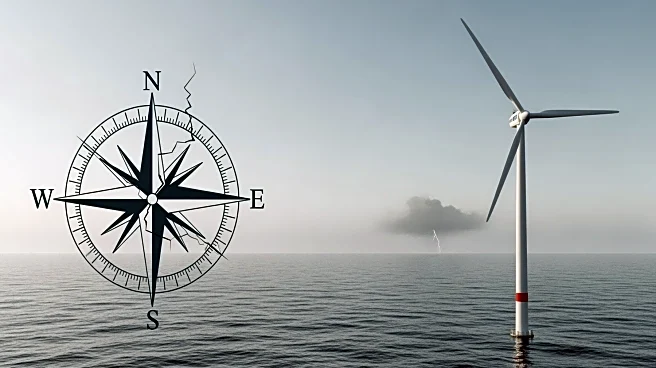What's Happening?
The global shipping industry's efforts to decarbonize are being significantly impeded by rising geopolitical risks, according to a recent analysis. The study highlights that geopolitical tensions, such
as the Russia-Ukraine conflict and the Nord Stream pipeline explosion, have led to a decline in decarbonization attitudes and increased carbon emissions. The geopolitical risk index has shown a marked increase, particularly in the Global North, including regions like Europe, East Asia, and North America. This rise in geopolitical risk is correlated with a decrease in positive attitudes towards decarbonization within the shipping sector, as evidenced by a drop in sentiment scores from 0.707 to 0.556 post-2019. The study also notes that while some countries in Southeast Asia maintain consistent decarbonization attitudes, others in Europe and the Middle East show a decline, reflecting the impact of geopolitical pressures.
Why It's Important?
The findings underscore the complex interplay between geopolitical stability and environmental policy, particularly in the shipping industry, which is a major contributor to global carbon emissions. The decline in decarbonization efforts due to geopolitical risks poses a significant challenge to achieving international climate goals. Countries with high trade dependencies are particularly vulnerable, as geopolitical tensions can lead to increased reliance on carbon-intensive trade routes. This situation highlights the need for robust international cooperation and policy interventions to mitigate the impact of geopolitical risks on decarbonization efforts. The study suggests that without addressing these geopolitical challenges, the shipping industry's contribution to global emission reduction targets may be compromised, affecting broader climate change mitigation strategies.
What's Next?
To counteract the negative impact of geopolitical risks on decarbonization, the study recommends several policy interventions. These include short-term measures like speed optimization and fiscal subsidies for green shipping, as well as long-term strategies such as enhancing green bunkering infrastructure and harmonizing international climate frameworks. The study emphasizes the importance of strengthening climate policies and monitoring them continuously to effectively counteract external risks. Additionally, there is a call for increased investment in green shipping technologies and infrastructure to support the transition to low-carbon maritime transport.
Beyond the Headlines
The study also highlights the ethical and economic dimensions of the issue, pointing out the disparity between the Global North and South in terms of geopolitical risk exposure and decarbonization attitudes. This disparity raises concerns about global inequality in addressing climate change, as countries with higher economic development and carbon emissions are more likely to scale back their decarbonization efforts in response to geopolitical risks. The findings suggest a need for equitable climate policies that consider the varying capacities and vulnerabilities of different nations, ensuring that global decarbonization efforts are inclusive and effective.











